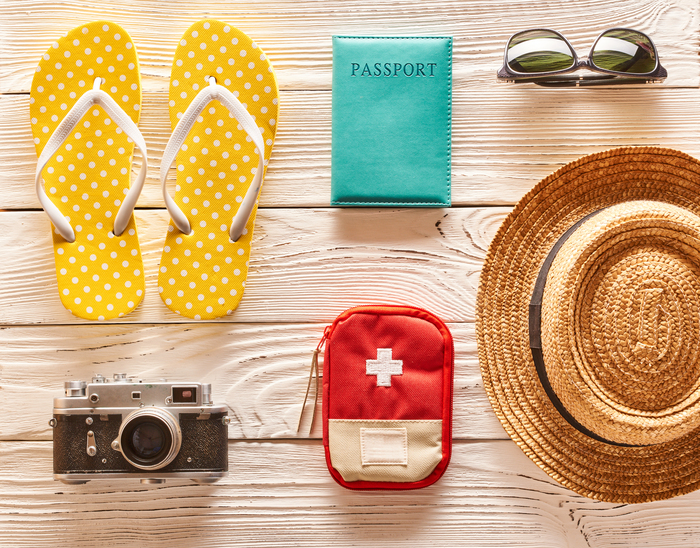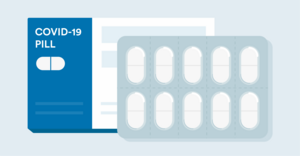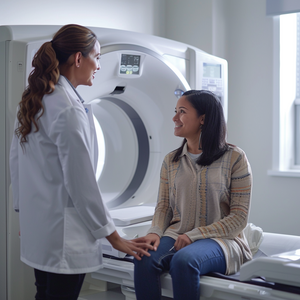Key points
- A well-stocked summer travel health kit can address common health issues such as sunburns, insect bites, and minor injuries, reducing stress during vacations.
- Essential items for a travel health kit include first aid basics, over-the-counter medications, personal hygiene and skincare products, health protection items, and travel-specific health needs.
- Tailoring your health kit to your specific travel destination and activities can save space and ensure you're prepared for any situation.
- Seek professional medical attention during travel for severe symptoms such as high fever, persistent vomiting, worsening allergic reactions, deep wounds, and signs of dehydration.

Whether you're heading to a tropical beach, hiking in the mountains, or exploring a bustling city, being equipped for health issues can make all the difference between a relaxing vacation and a stressful situation. From managing sunburns and bug bites to addressing unexpected illnesses, having a well-stocked travel health kit ensures you're prepared for any scenario. Below, we’ll cover the must-have items to keep you safe and healthy on your summer adventures.
Why do you need a summer travel health kit?
A well-prepared summer travel health kit is essential for addressing common health issues that can arise during your vacation. From sunburns and insect bites to stomach upsets and minor injuries, having the right essentials on hand can save time and reduce stress when unexpected situations occur. A well-stocked kit not only ensures that you’re ready to handle common summer ailments but also helps you adapt to specific travel environments, like packing extra sunscreen and insect repellent for tropical destinations or carrying altitude sickness remedies for mountain trips. By anticipating potential health needs, you can focus more on enjoying your journey and less on scrambling for solutions.
5 essential items for your summer travel health kit
Having the right essentials on hand can make a significant difference when dealing with minor health issues, whether a sunburn, bug bites, or a sudden upset stomach. These are the must-have items to ensure you’re prepared for whatever comes your way:
1. First aid basics
First aid basics are important to any summer travel health kit, as minor injuries can happen when you least expect them. Be sure to pack adhesive bandages in various sizes to cover cuts and scrapes, as well as antiseptic wipes and ointments to clean and protect wounds from infection. Include gauze pads and medical tape to cover larger injuries or apply pressure to bleeding. Tweezers are also essential for removing splinters or stingers, while small scissors come in handy for cutting tape, gauze, or even clothing in an emergency.
2. Over-the-counter medications
Including over-the-counter medications in your summer travel health kit can make a big difference when unexpected symptoms arise. Pain relievers like ibuprofen or acetaminophen help manage headaches, muscle soreness, or minor injuries. Antihistamines are essential for combating allergies triggered by pollen, insect bites, or unfamiliar foods. Pack anti-nausea, anti-diarrheal medications, and antacid tablets to relieve heartburn or indigestion after unfamiliar meals to handle digestive issues. For those prone to motion sickness, don’t forget to include motion sickness tablets to keep travel comfortable.
3. Personal hygiene and skincare
Maintaining personal hygiene and protecting your skin are vital when traveling, especially during the summer. Always include hand sanitizer and antibacterial wipes to keep your hands clean when soap and water aren’t available. Sunscreen with SPF 30+ and waterproof protection is a must to shield your skin from harmful UV rays, while lip balm with SPF helps prevent chapped, sunburned lips. Don’t forget insect repellent containing DEET or picaridin to keep pesky bugs at bay, especially in tropical or wooded areas.
4. Health protection items
Health protection items are essential to keep you safe and prepared during your summer travels, especially in crowded or high-risk areas. Pack reusable face masks to reduce exposure to airborne germs, and bring disposable gloves for situations where you may need extra protection, like cleaning wounds or handling potentially contaminated items. A digital thermometer is useful for monitoring your health if you feel unwell, while a small bottle of hand soap ensures you can maintain proper hygiene even when facilities are limited.
5. Travel-specific health needs
When planning for travel-specific health needs, it’s crucial to consider your destination and activities. Always pack prescription medications along with copies of your prescriptions in case you need a refill or face any issues during your trip. If you’re traveling to hot climates, include rehydration salts to prevent dehydration from excessive sweating. Mosquito nets are essential when visiting tropical destinations to protect against insect-borne diseases. Water purification tablets for camping or remote travel ensure safe drinking water when bottled options aren’t available.
Packing tips for different types of trips
When it comes to packing your summer travel health kit, your destination and activities play a big role in determining what you’ll need. Whether you’re headed to the beach, hiking in the mountains, or exploring a bustling city, tailoring your kit to your specific trip can save space and ensure you’re prepared for any situation.
Health kits for a beach vacation
For beach vacations, it’s important to pack items that protect you from sun exposure and the unique challenges of sandy environments. Bring extra sunscreen — preferably SPF 50+ that is waterproof and reef safe — to reapply throughout the day, along with sunburn relief gel to soothe any accidental overexposure. Sand removal powder helps keep your skin comfortable and sand-free after a day on the beach. Additionally, waterproof bandages are a must for protecting minor cuts while swimming, and foot care items, such as blister pads and soothing balms, help manage irritation from sand and saltwater.
Health kits for hiking and camping trips
When preparing for hiking and camping trips, it’s important to include items that address common outdoor challenges. Blister pads and anti-chafing balm are essential for keeping your feet comfortable on long treks, preventing painful hotspots and skin irritation. Portable water filters ensure safe drinking water when natural sources are your only option.
Health kit for international travel
International travel often requires extra precautions to ensure your health and safety while abroad. Always carry your vaccination records and any required international health cards to meet entry requirements and protect against local diseases. If traveling to regions where malaria is prevalent, pack anti-malarial tablets as prescribed by your healthcare provider. Additionally, bring copies of your medical insurance, including coverage details, and keep a list of emergency contact numbers handy.
Health kits when traveling with kids
When traveling with kids, it’s important to pack health essentials specifically suited for their needs. To ensure safe and effective dosing, include pediatric versions of common medications like pain relievers, antihistamines, and anti-nausea treatments. Opt for child-safe insect repellent and sunscreen to protect their sensitive skin. A reliable digital thermometer and fever reducers are also important for quickly managing any signs of illness.
Health kits for a road trip
Road trips can be long and unpredictable, so packing items that keep everyone comfortable and safe is essential. Motion sickness bags are a must for passengers prone to nausea, while cooling towels and electrolyte drinks help prevent dehydration and overheating during summer drives. Keep extra face masks and hand wipes easily accessible to maintain hygiene when stopping at rest areas or gas stations.
More tips for staying healthy while traveling
Staying healthy while traveling requires a few mindful practices that go beyond your packed health kit. Stay hydrated, particularly in hot climates, to prevent dehydration and heat-related issues. When water quality is a concern, opt for sealed bottled water instead of tap water. Good hand hygiene is essential — wash your hands frequently or use hand sanitizer, especially before eating. Be mindful of food choices to avoid foodborne illnesses, especially when traveling abroad. Lastly, take regular breaks during long drives to prevent fatigue and maintain alertness.
When should you see a doctor during travel?
While minor health issues can often be managed with your travel health kit, some situations require professional medical attention. Seek a doctor if you experience:
- A high fever
- Persistent vomiting
- Severe pain that doesn’t improve
- Allergic reactions that worsen, especially with swelling or difficulty breathing
- Deep cuts or wounds that continue to bleed despite first aid
- Persistent diarrhea or signs of dehydration — like dizziness, dry mouth, and dark urine
- Infections that worsen despite treatment
Find urgent care near you while traveling
Finding prompt medical care can be stressful if you experience health issues while traveling. With Solv, you can quickly locate nearby urgent care centers, even when you’re far from home. Book same-day appointments for non-emergency issues like minor injuries, infections, or unexpected illnesses, so you can get back to enjoying your trip!
FAQs
Why is a summer travel health kit necessary?
A summer travel health kit is essential for managing common health issues that may arise during your vacation. It can help you handle minor injuries, sunburns, insect bites, stomach upsets, and other unexpected situations. The kit can be tailored to your specific travel environment, ensuring you're prepared for any scenario and can focus on enjoying your vacation.
What are the essential items to include in a summer travel health kit?
A summer travel health kit should include first aid basics like bandages, antiseptic wipes, and tweezers; over-the-counter medications for pain relief, allergies, and digestive issues; personal hygiene and skincare items like hand sanitizer, sunscreen, and insect repellent; health protection items like face masks, disposable gloves, and a digital thermometer; and travel-specific health needs like prescription medications, rehydration salts, mosquito nets, and water purification tablets.
How should I tailor my summer travel health kit based on my destination and activities?
Your destination and activities will determine the specific items you need in your health kit. For example, beach vacations require extra sunscreen and sand removal powder, hiking trips need blister pads and portable water filters, and international travel often requires vaccination records and anti-malarial tablets. If you're traveling with kids, you should include pediatric versions of common medications and child-safe skincare products.
When should I seek professional medical attention while traveling?
While minor health issues can often be managed with your travel health kit, you should seek professional medical attention if you experience a high fever, persistent vomiting, severe pain that doesn’t improve, worsening allergic reactions, deep cuts or wounds that continue to bleed, persistent diarrhea or signs of dehydration, or infections that worsen despite treatment.
How can I find urgent care near me while traveling?
If you experience health issues while traveling, you can use services like Solv to quickly locate nearby urgent care centers. You can book same-day appointments for non-emergency issues like minor injuries, infections, or unexpected illnesses, so you can get back to enjoying your trip.









